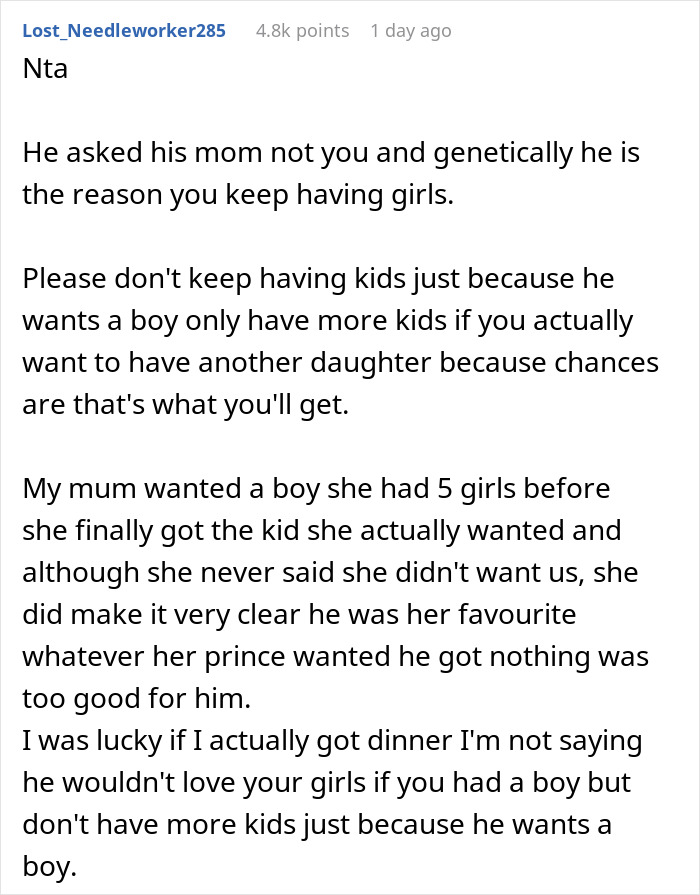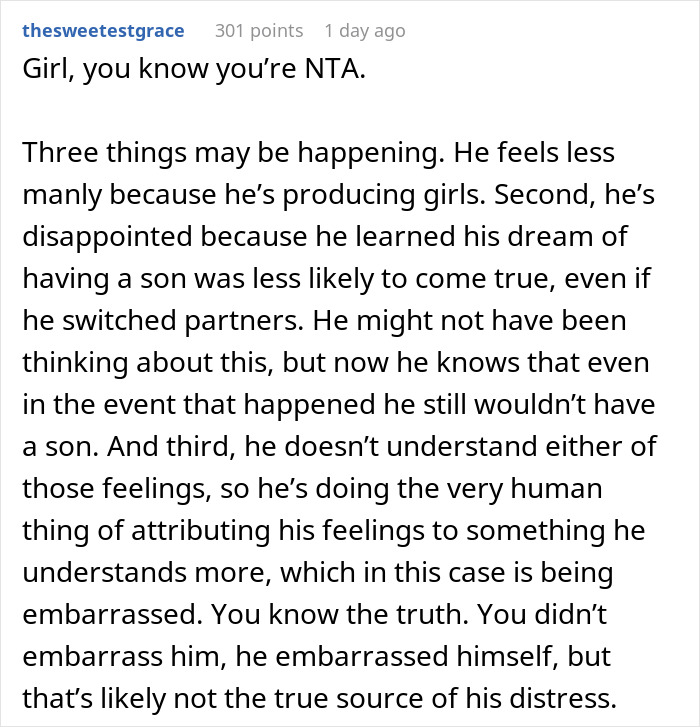For pregnant couples, the most important thing is usually that a baby is healthy, whether it’s a boy or a girl. But some parents do hope for one or the other, especially if they already have a few kids of the same sex.
This redditor’s husband—a soon-to-be-dad to their third daughter—admitted being a little disappointed that the third bundle of joy wasn’t going to be a boy. However, he wasn’t surprised as he believed that it was related to his wife having three sisters. Little did he know that he was in fact the one determining the sex of the baby.
Seeking to learn more about how the sex of the child is determined, Bored Panda got in touch with a lecturer at the University of Waterloo, expert in Biomedical Science, Dr. Heidi Engelhardt, who was kind enough to answer a few of our questions. Scroll down to find her insight in the text below.
Waiting to learn the sex of your baby can be an exciting time

Image credits: voronaman111 / Envato (not the actual photo)
This man was shocked to learn that it’s the father who determines the sex of the baby
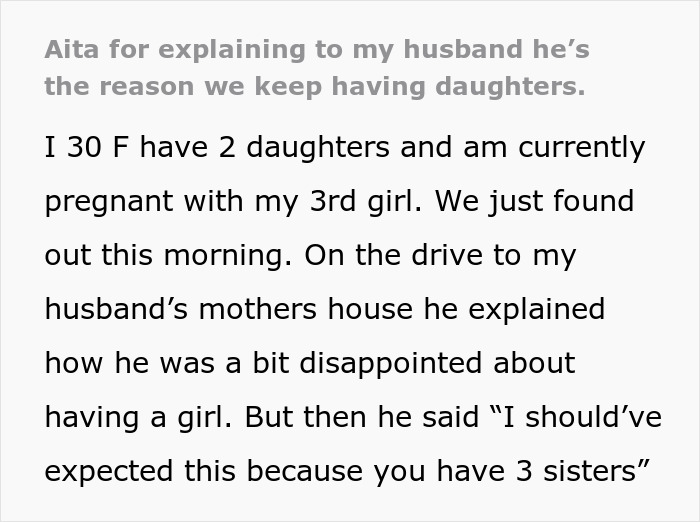
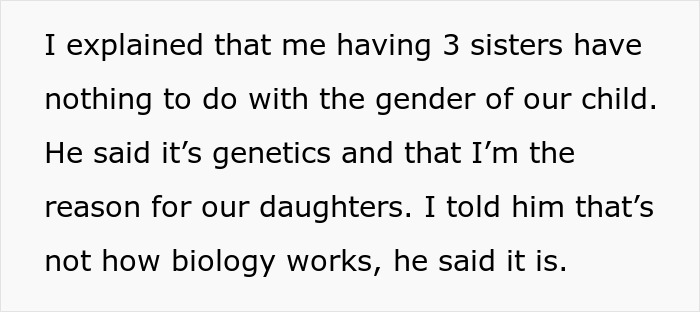
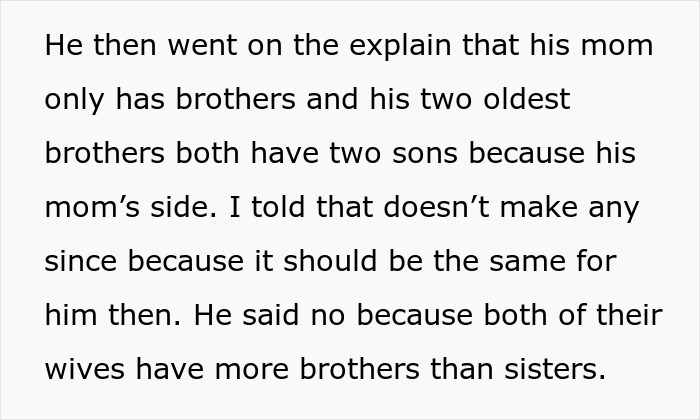
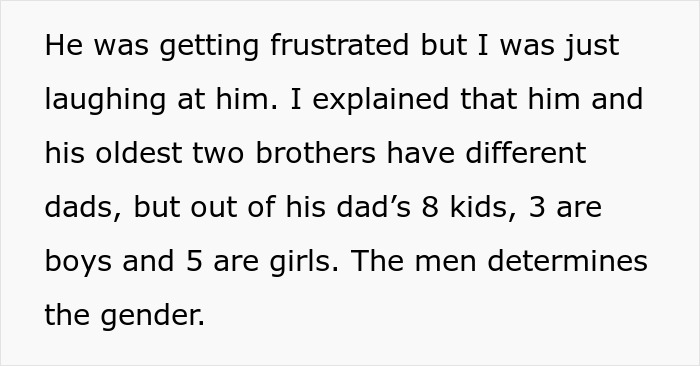

Image credits: Gustavo Fring / pexels (not the actual photo)

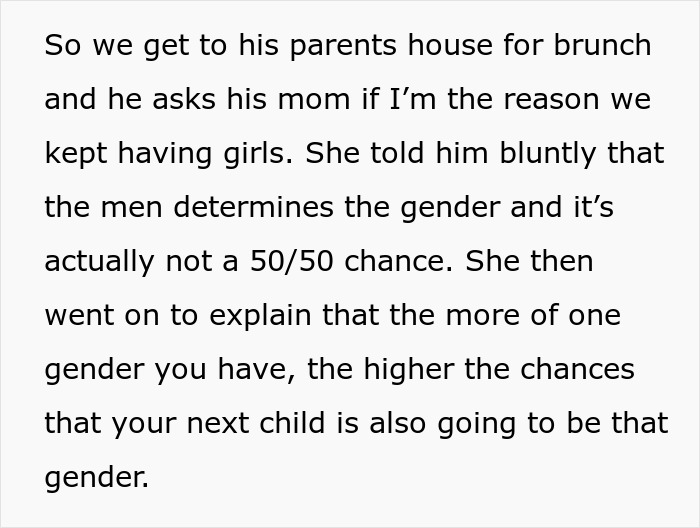

Image source: MaleficentType4187
The sex of the child is determined by the chromosomes passed down from the parents
While wishing to have a boy after two daughters in no way means that a parent would love the little one any less if they were a girl, the OP’s husband didn’t hide his disappointment upon learning the sex of their child. Neither did he hide the frustration when his wife tried explaining to him that it has nothing to do with her having three sisters or his mom growing up surrounded by brothers; it is determined by the chromosome passed down from the father.
“Speaking broadly, the male does determine the sex of the child. Getting more specific, it is which of the male’s sperm—of the 500 million or so in that ejaculate—that wins the race to fertilize the oocyte (egg),” Dr. Heidi Engelhardt explained.
“Each sperm has 23 chromosomes (unpaired), chromosomes 1-22 and the sex chromosome. The sex of the child will depend on whether the egg was fertilized by a sperm containing a Y chromosome or an X chromosome.
“The Y chromosome contains a gene, SRY (sex-determining region Y gene), that codes for a master transcription factor (regulator of expression of other genes),” the expert in biomedical science continued. “When SRY turns on (a bit after 6 weeks gestation in humans), it sets off a developmental pathway that transforms the bipotential (generic) fetal gonad into a testis. Products of the testes then drive the development of the rest of the male reproductive tract.”
The sex of the baby is a matter of chance
The OP’s husband wasn’t convinced by his wife when she said it was the man who determines the sex of the baby, which is why he turned to his mother—someone with a degree in biology—to see if she was right. He likely came to regret it soon after, as his mom seconded his wife. She also added that it’s not a 50/50 chance—according to the World Health Organization, the natural sex ratio at birth is about 105 boys to every 100 girls.
But regardless of what the ratio is, it always remains a matter of chance, as you can never know for sure if it’s going to be a boy or a girl, even if you already have several children of the same gender. “Thinking it is any different is like expecting to roll a six because you haven’t rolled one in a while, as if you are ‘owed’ a six,” Dr. Engelhardt compared.
The expert revealed that it’s impossible to determine how likely a couple is to have a boy or a girl before they get pregnant; not without assisted reproductive technology (ART), at least. “With various ART procedures (lots of technology), it is possible to [use] in vitro fertilization (IVF)—let the embryos develop in the lab for a week or so, pull off a few cells from each for genetic testing (looking for the SRY gene), and only put a male embryo into the mother’s uterus for development. Then you would be 100% likely to have a male child, barring lab error,” Dr. Engelhardt explained, adding that in some countries, non-medical sex selection is illegal.
If you’re wondering how many bundles of joy who came into this world recently were male or female at birth, in 2023, for instance, there were a total of 134,279,612 babies born across the globe, 32,662,050 of whom were male and 28,098,100 female.
People in the comments shared their opinions, they did not think the redditor was being a jerk to her husband




